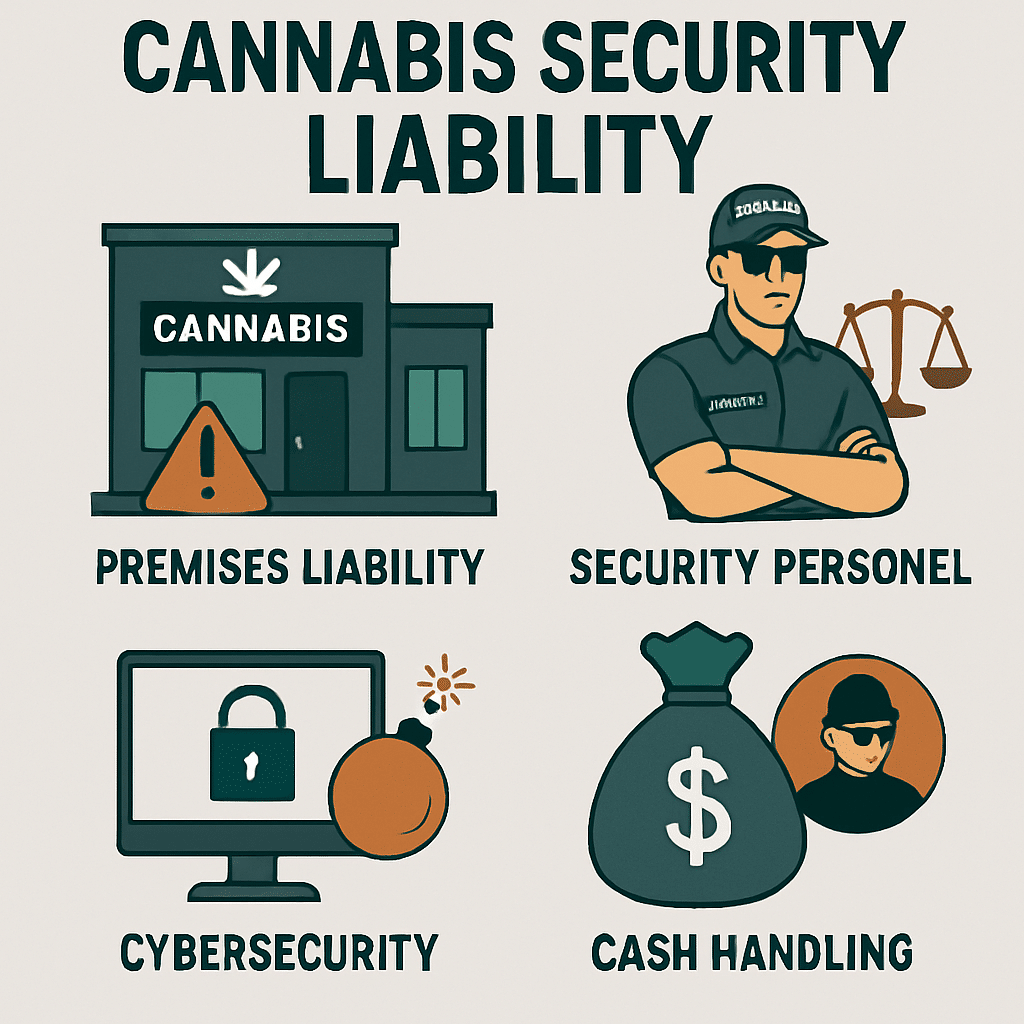One of the core risks of any business that has a brick-and-mortar component is a legal concept known as premises liability. Premises liability broadly refers to the physical damage that can occur to people or property on business premises and helps determine if the business is at fault for that damage.
Security liability is a subset of premises liability that, for most businesses, is a relatively minor concern. For environments like legal cannabis dispensaries that are considered “high-risk,” however, security liability is a major concern with stringent regulatory requirements.
Legal cannabis operators (LCOs) are considered high-risk due to two primary factors. First, cannabis remains a favorable commodity to sell via black market hubs. Second, the illegality of cannabis on the federal level makes LCOs an unappealing client for most financial institutions, leaving them stuck dealing in large amounts of cash. These two factors make LCOs an attractive target for criminals, which the state has responded to by foisting responsibility onto the LCOs themselves.
These enhanced requirements may present a substantial headache for the LCO, but the dire financial and legal consequences of a security failure make it well worth taking seriously. The following key security areas are essential to keep your business compliant with most security liability regulations.
Why A Security Plan Matters
Premises liability laws hold dispensary owners accountable for the safety of employees, customers, and vendors. This means that any security incident, whether it be a robbery, altercation between customers, or an on-site injury, can result in financial and legal consequences for the business.
California law requires a security plan that clearly lays out how a security system comprised of required elements like video surveillance, access control and alarm systems, and security personnel interface together. A poorly crafted security plan can significantly impede your ability to defend against claims of negligence if an injury occurs on-premises.
On the flipside, a well-made and comprehensive security plan can provide an effective bulwark against any claims made against the business by detailing how each element of the system is compliant and how the response procedure went according to plan. It cannot be understated how important it is to have a security plan that clearly shows that the security system is both compliant and comprehensive.
Liability & Security Personnel
One of California’s major requirements for dispensary security is the presence of guards and other security personnel. Unfortunately, this requirement opens the dispensary up to even more liability, as poorly trained security personnel can make mistakes that lead to major consequences for their client.
Stories about overzealous security guards hassling customers and passers-by are a frequent occurrence in the security field. This propensity for using force to solve problems can lead to claims of excessive force against the dispensary, leading to costly lawsuits and hikes in insurance premiums.
Poorly trained guards may also respond recklessly or negligently during security incidents. Poor performance during a critical moment can cause injury, damage to property, and even death – none of which is good news for the dispensary.
On-site security personnel present such a liability risk that many companies are reducing their roles as far as possible by turning to remote guarding solutions. These high tech security solutions use drones and specialized monitoring trailers to observe the premises and alert authorities to unauthorized entrants.

Cash Handling Systems
Dispensaries dealing primarily in cash opens them up to significant risks from both external and internal forces. In order to combat these risks, strict guidelines need to be put in place that details out how cash will be counted, stored, transported, and deposited.
Loose money is a major source of temptation for even the most scrupulous employees, and far more people than one may expect can rationalize skimming off the top during normal transactions. A core part of the business plan for dispensaries needs to be dedicated to keeping impeccable transaction records and consistent counts for the money on-premises.
Transporting cash can expose it to significant risk, as organized crime is well aware of dispensary’s reliance on paper transactions and have frequently targeted transport vehicles in transit to the bank. Utilizing the services of armored transports that expose the money only in highly monitored locations can de-risk financial transactions for a slightly higher cost.
The extra security liability requirements levied by the state onto LCOs can be a major headache without the right help. By enlisting the services of a cannabis-specific security contractor like Cannabis Compliant Security Solutions, LCOs can focus their efforts on running a business while under the protection of a professionally crafted security plan and system. Call today!

Recent Comments